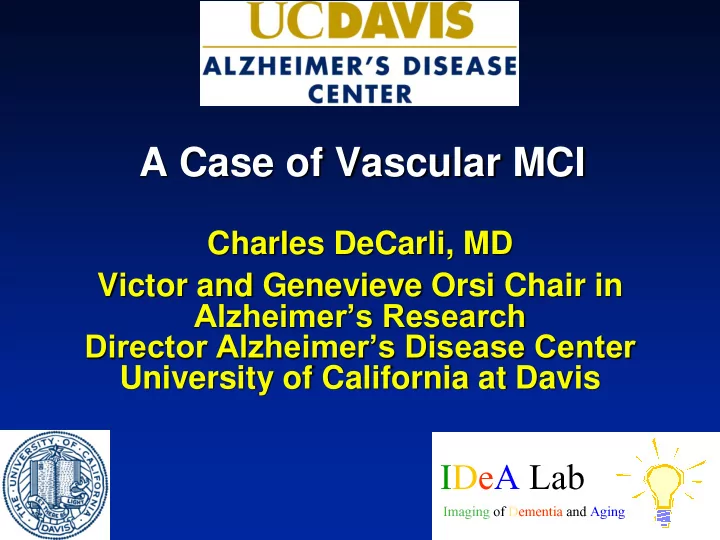

A Case of Vascular MCI Charles DeCarli, MD Victor and Genevieve Orsi Chair in Alzheimer’s Research Director Alzheimer’s Disease Center University of California at Davis
Initial Evaluation 78 y.o. Rt. Handed Male Memory decline starting ~2003. 2005- Mild problems with language; including comprehension 2000- CVA- dragging L foot; stroke dxd. Residual L hemiparesis and L arm dysaethesias Concerns regarding driving- since 2003- not staying in his lane, drifting towards incoming traffic. Not getting lost. Chronic problems with irritability and anger. Hx of depression, personality problems.
Initial Evaluation (cont’d) Late 2004- hands ‘shaking’, difficulty with yard work and painting Hx falls and minor incontinence for a couple of yrs. Cane for 5 yrs, occasional walker Recent difficulties with organization and taking medications Can handle money and operate home appliances MMSE= 26 (06/2005) 25 (4/2006); started on Aricept (5 mg), ‘MCI vs. mild dementia?’, increased to 10 mg (8/2006).
Initial Evaluation PMH: CVA 2000, mild hypertension increased cholesterol Meds: amitriptyline (25 mg), Gabapentin (800 TiD), HCTZ, Simvastatin SH: retired mechanic, 12 yrs. Educ., Smoked 100 pkyrs then quit in 2002, no current ETOH FH: Mother had LO-AD
Physical Exam (IE) PE: Cor- frequent PVCs. Ext- decreased pulses in the LEs. Neuro Exam: MMSE = 29/30 (-1 season) BIMC = 32/33 CNS: decreased sensation lower L face, decreased hearing bilaterally Motor: slightly spastic L arm; decrease in strength L arm and leg; L intention tremor; decreased RAMs on L more than R. DTRS: 3+ L KJ; 2+ R side except absent AJs bilaterally; L plantar responses equivocal. No Frontal Release Signs.
Consensus Diagnosis Multi-domain amnestic MCI; vascular etiology likely, AD somewhat likely
1 year later…. No decline in cognitive function Wears pad for some urinary incontinence, No bowel incont. Wife continues to dispense meds Mood ‘good’, but occasionally ‘crabby’, sleeps 12 hrs/night Uses a cane ‘to support knees’ No longer drives, but has license No difficulty with basic ADL’s Goes to church, bowls weekly (scores ~ 135), watches TV, plays dominoes
1 year later… Neuro Exam: MMSE= 26 (-1 year, day, date, place) STM: 2/5 on name and address 4/5 with cue 1.5/3 nonsense shapes after delay, intact recognition Motor: slight L arm spasticity, strength 5- R side; L WE, BC, TC 4+; deltoid 4; FE, FF 4-; L leg 4+ except dorsiflexors and plantar flexors 5-; RAMs moderately reduced on L, mildly reduced on R; No limb ataxia, Couldn’t do HTS on L. DTRs: 2 upper extremities and sym., 2+ KJs, trace AJs. L toe equivocal. Gait: need to push off to arise. Neg. Romberg & Pull test.
Additional F/U visits 2 years later… MMSE 24/30 & BDS 23/33 5 years later… MMSE 16/30 & BDS 13/33 CDR = 2
End-of-life History Died 05/22/1010 Due to Pulmonary embolism. No Hx of additional strokes.
Longitudinal Cognitve Performance 0.5 0 -0.5 -1 Executive -1.5 Memory -2 -2.5 -3 -3.5 2006 2007 2010
MRI Results
MRI Results
PiB Imaging
GROSS BRAIN EXAM Brain weight (fixed): 1333 grams. Moderate to severe atherosclerosis of the circle of Willis. Bilateral and multifocal cystic, non-cavitary, and lacunar infarcts in subcortical white matter and basal ganglia. Old lacunar infarct – basis pontis.
NEUROPATHOLOGIC DIAGNOSIS Cerebrovascular disease: Atherosclerosis, moderately severe in major branches of the circle of Willis, extending focally into many leptomeningeal arteries Arteriolosclerosis/ lipohyalinosis, variably severe throughout the brain, in many parenchymal arteries Vascular calcinosis, severe and extensive, in ganglionic arteries
NEUROPATHOLOGIC DIAGNOSIS Alzheimer’s disease changes, Braak stage III: Neurofibrillary tangles confined to the hippocampi/parahippocampal regions Senile plaques, sparse to moderate, in cortex and hippocampi No amyloid angiopathy
Key Findings History of stroke Focal findings on clinical examination consistent with history of stroke Imaging features of substantial CVD Lack of severe cognitive impairment at initial assessment despite functional impairment
Recommend
More recommend